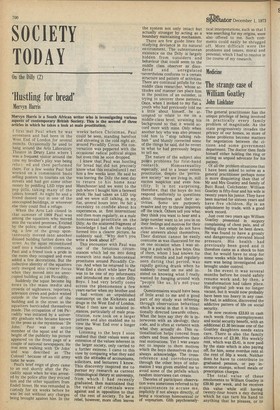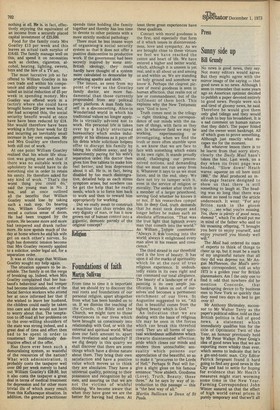Medicine
The strange case of William Goatley
John Linklater
The general practitioner has the unique privilege of being involved in practically every family problem of magnitude. As the state progressively invades the privacy of our homes, so more of these problems become matters for negotiation between the citizen and some government department. The doctor then finds himself either holding the ring or acting as unpaid advocate for his patient. Of all the problem situations that I have been asked to solve as a general practitioner perhaps none is more disquieting than that of Mr and Mrs Goatley and family of Butt Road, Colchester. William Goatley is fifty-four and his wife is twenty years his junior. They have been married for sixteen years and have five children. He is an upholsterer by trade, with a good work record.
Just over two years ago William Goatley presented in surgery complaining of chest pain, and of feeling dizzy when he bent down. He was found to have a grossly and dangerously elevated blood pressure. His health had previously been good and it therefore came as a shock to him that he would have to stop for some weeks while his blood pressure was being investigated and brought under control.
In the event it was several months before he could safely resume work and, by then, a transformation had taken place. His original job was no longer vacant, but it would now probably have been too heavy in any case. He had, in addition, discovered the addictive pattern of life on social security.
He now receives £23.83 in cash each week from unemployment and social security benefit, with an additional £1.30 because one of the Goatley daughters needs extra care. There is also the family allowance of £3.90. His weekly rent, which was £5.41, is now paid by the state which is also paying off, for him, some overdue rent at the rent of 50p a week. Neither does he have to contribute to graduated pension, or pay insurance stamps, school meals or prescription charges.
The total value of these emoluments to William Goatley is £39.80 per week, and he receives this value 'while still having twenty-tour hours a day during which he can turn his hand to anything that he pleases, or to
nothing -at all. He is in fact, effectively enjoying the equivalent of an income from a securely placed capital investment of £25,000.
Food for the family costs Mrs Goatley £13 per week and this leaves an actual cash surplus of £16.03. The family manage well on this, and spend it on necessities such as clothes, cigarettes, alcohol, heating, lighting, sweets, toys and the hire of a TV set.
The most lucrative job so far offered to William Goatley in his own trade and within his competence and ability would have entailed an initial reduction of £5 per week in spending money. Mrs Goatley was offered work in a factory where she could have brought home £20 per week but, if she had accepted this, the social security benefit would at once have have been reduced by £18. She would therefore have been working a forty hour week for £2 and incurring an inevitably small increase in her own expenses. Mr and Mrs Goatley are therefore both still out of work.
At one point William Goatley realised that his whole life situation was going sour and that if there was no suitable work in upholstery he would have to do something else in order to retain his sanity. He therefore asked for any kind of work. "That's the worst thing you could do," said the young man in No. 2 box, and at once outlined all the benefits that William Goatley would lose by taking such a rash step. On hearing this, William Goatley experienced a curious sense of doom. He had been trapped by the system. He became more and more bad tempered and drank rather more. He now spends much of the day at home where he and his wife get on each other's nerves. So high has domestic tension become that Mrs Goatley recently applied to a solicitor, under legal aid, for a separation order.
It was at this stage that William Goatley sought my help again.
The situation appears to be insoluble. The family is on the verge of breaking up. Indeed, when Mrs Goatley complained that her husband's behaviour and bad temper had become intolerable, one of the Social Service workers who attend her at once informed her that if she wished to leave her husband, the children could easily be taken into care and she would not have to worry about that. The temptation to off-load all her problems on to the ever-willing shoulders of the state was strong indeed, and a great deal of time and effort then had to be spent in order to counteract the insidiously destructive effect of the offer.
Has there ever been such a demoralising system, so wasteful of the resources of the nation? What with administration, it probably costs the taxpayer well over £80 per week merely to hand out William Goatley's £39.80, but It also costs the taxpayer a great deal in terms of medical treatment for depression and for other more trivial ills of which many result from this Kafkaesque situation. In addition, the general practitioner spends time holding the family together and thereby has less time to devote to other patients with a more strictly medical pathology.
There must be less insane ways of organisingra social security system so that it does not offer a positive disincentive to productive work. If the government had been secretly inspired by some antiBritish ideology, they could hardly have thought of a system more calculated to demoralise by producing apathy and sloth.
The issues, as seen from my point of view as the Goatley family doctor, are more fundamental than those currently propounded from any political party platform. A man finds himself in a disconcerting, Alice:in Wonderland world in which his traditional values no longer apply. He is virtually advised not to work. His personal life is taken over by a highly structured bureaucracy which smiles indulgently at his idleness as it pays off his debts while solicitous helpers offer to disrupt his family by taking his children away, and by benevolently paying for his wife's separation order. His doctor then gives him free tablets to make him feel better, and less depressed about it all. He is, in fact, being disabled by too much disintegrative, detailed help as each stress symptom arises, but nowhere can he get the help that he really needs, which is to force him back to work and then to reward him appropriately for working.
Did we really mean to construct a machine that thus erodes the very dignity of man, or has it now grown out of human control into a gigantic, demonic parody of the original concept?











































 Previous page
Previous page